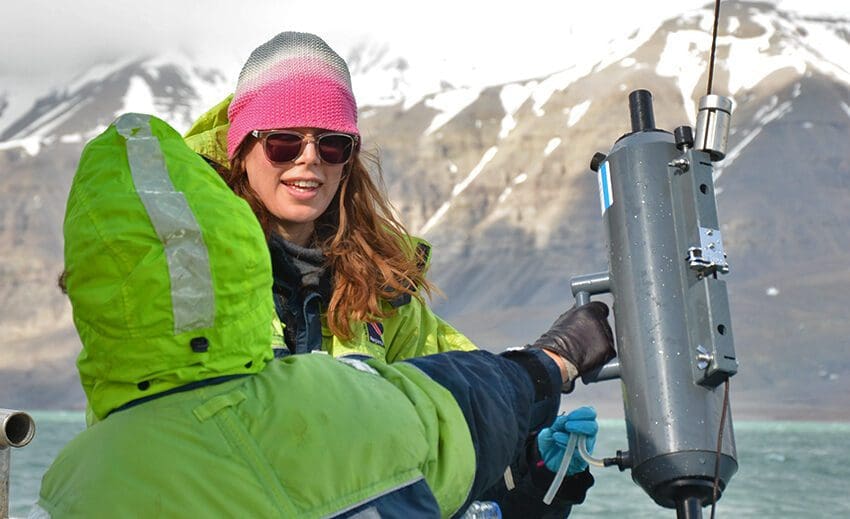Drivers of the marine CO2 system in the High Arctic – from the deep basins to the shallow fjords

Ylva Ericson collecting sea water samples in Tempelfjorden. Photo: Xiangcai Chen/UNIS
Top image: Ylva Ericson collecting sea water samples in Tempelfjorden. Photo: Xiangcai Chen/UNIS
UNIS PhD candidate Ylva Ericson has studied the the marine CO2 system and its associated drivers in different areas of the High Arctic. Ericson will defend her doctoral thesis on 20 February at the University Centre in Svalbard, UNIS.
24 January 2019
Press release from the the University Centre in Svalbard (UNIS) and University of Bergen
The marine CO2 system plays a fundamental part of the Arctic carbon cycle. Since the high Arctic is largely inaccessible due to sea ice and altogether harsh conditions in the dark winter season, the current understanding of the carbon cycle is vulnerable to both the spatial and temporal distribution of the existing data. The fact that the Arctic is in transition due to climate change makes it the more important to fill the knowledge gaps on the carbon cycle that prevail.
About the thesis
This thesis is not only an attempt to add data to the existing pool of measurements, but also an investigation of processes that drive changes in the marine CO2 system. A time series of nearly three years from Adventfjorden, a fjord branch of the Isfjorden system that is situated on the West Spitsbergen coast, shows that CO2 is taken up from the atmosphere throughout the year. This uptake is largely governed by seasonal changes in biological processes and temperature, which reflects the absence of sea ice that has prevailed over the last couple of years. A time series from the neighboring glacier-influenced fjord branch, Tempelfjorden, also shows that freshwater runoff can contribute with a fourth of the CO2 uptake over the melt season. Further north, observed trends of increasing total dissolved inorganic carbon of 0.4–0.9 µmol kg-1 yr-1 at the intermediate depths of the deep Arctic basins, are likely a result of uptake of anthropogenic carbon in the Atlantic Water that flows into the area. Also, further up in the water column at depths between 50 to 150 m, the signature of organic decay products that originates from the bottom of the river-influenced East Siberian Sea can be traced all the way to the Fram Strait. This rather fresh water type is undersaturated in the calcium carbonate minerals aragonite and calcite and can therefore have negative consequences for shell-building calcifying marine organisms.
Dissertation
Ylva Ericson will defend her thesis entitled “Drivers of the marine CO2 system in the High Arctic – from the deep basins to the shallow fjords” at 13:15 on Wednesday 20 February. She will give a trial lecture at 13:15 on Tuesday 19 February entitled “Organic carbon in the Arctic Ocean and potential climatic feedbacks”. Both lectures will take place in Lassegrotta, UNIS/Svalbard Science Centre, Longyearbyen.
The committee consists of Dr. Lisa Miller, Centre for Ocean Climate Chemistry, Department of Fisheries and Oceans, Canada (1. opponent); Dr. Sara Jutterström, Researcher at IVL Swedish Environmental Research Institute, Gothenburg, Sweden (2. opponent); and Prof. Frank Nilsen, UNIS (Internal member and leader of the committee).
The thesis work has been supervised by Prof. Eva Falck from UNIS and the University of Bergen and Dr. Melissa Chierici from UNIS and the Institute of Marine Research.
This doctoral project has been supported by UNIS and the Arctic Field Grant from the Svalbard Science Forum. The study was also supported by the Ocean Acidification flagship within the FRAM – High North Research Centre for Climate and the Environment.
 About the candidate
About the candidate
Ylva Ericson was born 1982 in Lysekil on the west coast of Sweden. Raised by the sea, she took a special interest in the ocean at an early age. She completed her Master of Science with a major in Marine Sciences at the University of Gothenburg in 2014, after which she started her PhD work at UNIS.